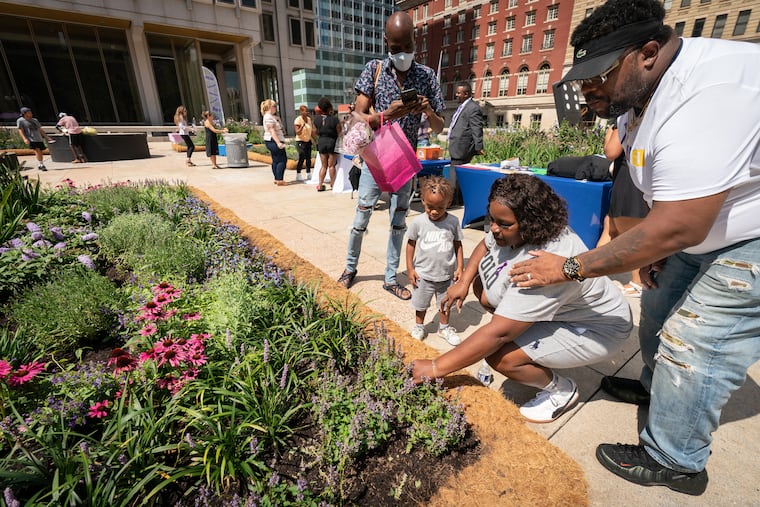‘It’s the pain with the love, side by side’: Philly opens a memorial garden for overdose victims
The garden will be open through the month of September, and memorializes victims after a year in which more than 1,200 people died of an overdose in Philadelphia.

Dozens of people who have lost friends and relatives to overdose gathered outside City Hall on Wednesday to open a pop-up memorial garden honoring their loved ones.
Four lush flower beds were dotted with small wooden markers bearing the names of overdose victims from the region, which has weathered devastating rises in overdose deaths for years. With at least 1,276 deaths, 2021′s overdose toll is expected to be Philadelphia’s highest ever, according to state data.
On Wednesday, parents pushed markers with their children’s names into the mulch and hugged one another in support. Some carried photographs or wore T-shirts with the pictures of the ones they’d lost.
Kim Robinson-Presley, whose daughter, Kimera, died in February 2021, told attendees that she wants to make sure her daughter is not forgotten or dismissed as a statistic. “I hated the idea of people thinking my daughter was a nobody,” she said.
Robinson-Presley is in long-term recovery herself, and described her pain as her daughter, a mother of three, struggled with addiction. Since her daughter’s death, Robinson-Presley has found solace in a bereavement group run by the city health department, which also helped organize the memorial.
“I don’t want anyone to have to go through this,” Robinson-Presley said. “I hate the reason why I’m here, but I’m so grateful to these groups. I don’t know where I would be otherwise.”
The garden is the first city-sponsored memorial of its kind. The idea was spearheaded by Susan Ousterman, whose son Tyler Cordeiro died from an overdose in 2020. Like many family members, she has turned to activism around overdose prevention and addiction treatment access.
“We still need more — we need a permanent memorial,” she said. “But it’s given me hope that people are listening and change is possible.”
» READ MORE: Struggling with an addiction, or know someone who is? Here are ways to get help.
The garden will be open throughout September and is staffed by employees and alumni from One Day at a Time, a local addiction-treatment program. The staff, many of whom are in recovery themselves, will be on hand to share their own stories and help educate visitors on the overdose crisis.
Laura Vargas, the manager for the city’s Substance Use Prevention and Harm Reduction program, coordinated the memorial’s opening, which for her was a bittersweet occasion. The garden is beautiful, but it was “heartbreaking to know we’re here for something so tragic. It’s the pain with the love, side by side.”
Parents spoke about how their children had battled both addiction and the pervasive stigma around their condition. “Yes, there were rehabs, interventions, endless nights that the family was out searching for him,” said Ramon Cruz of his son Christopher, who died of an overdose on June 28. “But these moments did not define him as a person. And it does not mean he was loved any less.”
Ramon Cruz, who is from Kensington, struggled with addiction and spent years in and out of prison for dealing drugs. He’s been in recovery since 2015 and now works for the Department of Behavioral Health and Intellectual disAbility Services. “After so many years of being a problem in the community, I’m now part of trying to find solutions,” he said. “Recovery is possible. I’m not the person I used to be because I believe in myself today.”
After the speeches and a ribbon-cutting, attendees walked past the flower beds, reading the names on the markers. Terri Spina had to ask a counselor to help her fill out a wooden marker because her hands were shaking too much to finish writing her daughter’s name: Gina Marie Vincent, who was 31 when she died.
“I go to everything I can to honor my daughter. She was beautiful, kind, generous. I think of her every second of every day,” Spina said. “It’s heartbreaking to be around everyone else, and heartbreaking, but comforting knowing we’re not alone.”